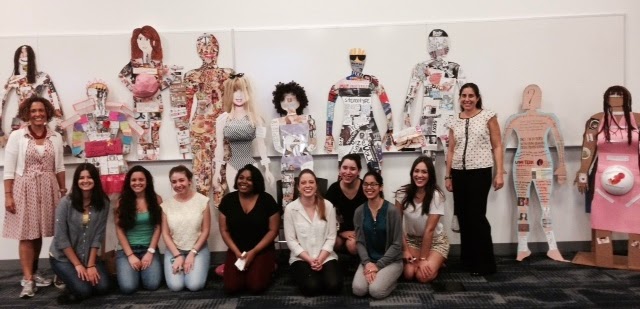A couple of weeks ago, I had the honor of speaking at Miami-Dade College for Women’s History Month. A number of the students in attendance, as part of a class project, had constructed life-size body collages exhibiting information about eating disorders. Here’s a panoramic shot of the students with their projects, their professor, and me:
So wonderful, right? And here are some of the individual projects close up. The first is a visual representation of the emotional pain and body distortion inherent to anorexia:
The second collage highlights the relationship between eating disorders and pregnancy, commenting on the impact of disordered eating on a growing fetus:
I even got to pose with a life-size Barbie, one student’s interpretation of Mattel’s popular diva:
This Barbie sported post-it notes highlighting her “thin arms,” “thigh gap,” and other unrealistic, culturally idealized body features. Even life-size, though, her facial expression was manufactured by a printer, and she’s barely three dimensional. There’s just something much more compelling about real-life people, isn’t there?
One of the most sobering parts of the event occurred as I was gearing up to speak, witnessing various students, faculty members, and other passersby observe the students’ creations. One middle-aged woman took a casual glance at the body projects and commented, “I wish I had an eating disorder.”
It’s never too late to incorporate another anecdote into a talk. . . .
You can find Does Every Woman Have an Eating Disorder? Challenging Our Nation’s Fixation with Food and Weight on Amazon (as a paperback and Kindle) and at BarnesandNoble.com.
|
|
(c) Does Every Woman Have an Eating Disorder? – Read entire story here.



